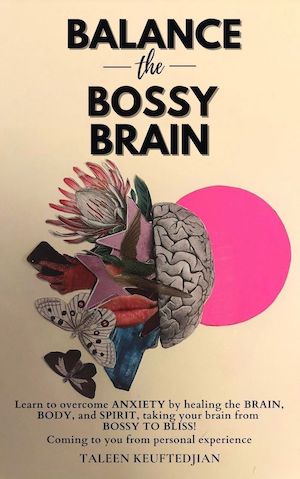Are You Feeling Overwhelmed with a Busy Brain Caused By Sensory Overload?
The day you stop racing is the day you win the race.” – Bob Marley
Modern day living has become busier than ever with bustling cities, busy work schedules, emails, meetings, social engagements, social media, nonsensical news and political drama. This sensory overload can lead to what experts are calling, busy brain syndrome. The brain is on such high alert that the body literally starts to look at this information overload as an actual threat. In response, the emotional part of the brain called the amygdala triggers the “fight or flight” response to deal with the perceived threat.
What is Busy Brain Syndrome?
Busy brain syndrome is an overabundance of stimulating information, which takes away from the brain’s capacity to focus and learn new things. The brain’s job is to keep us safe, which is why it triggers the “fight or flight” response when it senses danger. The part of the brain responsible for the “flight or fight” response is the amygdala. Think of the amygdala as a guard dog. When the amygdala senses danger, it signals the adrenal glands to release stress hormones. These stress hormones are responsible for elevating blood pressure, increasing heart rate, constricting blood vessels, and tensing of muscles, all needed in order to provide you with the energy required to overcome a perceived threat. The brain becomes so preoccupied and addicted to information that it becomes fearful of missing out, better known as FOMO. The amygdala notices that you’re on high alert, so it triggers the “fight or flight” alarm.

How A Busy Brain Affects Your Life
The problem with a busy brain is that it interferes with our ability to unwind, sleep, focus, and remember things. Sometimes it’s hard for the person to realize they’re suffering from a busy brain because they’re so caught up in sensory overload. When in a busy brain state, there’s not a lot of cognition available for use, so the brain relies on sensory memory. The brain no longer has an attention span to learn new things or focus on the present moment. Busy brain interferes with a person’s ability to take in new information, as well as observe and assess their surroundings, because they are so preoccupied in their thoughts. This diminishes the person’s ability to multitask, catch mistakes, and react quickly. For example, someone with a busy brain has a higher likelihood of getting into a car accident. Driving usually involves running on autopilot, but the person must be able to observe and assess their surroundings. Someone experiencing a busy brain could miss a red light, stop sign, or miss-judge other driver’s actions, putting them at higher risk of an accident.
How Do I Know If My Brain is on Sensory Overload?
Do you find yourself excessively checking your social media accounts or emails? Do you find yourself easily distracted and forgetful of what you were doing prior to the distraction? Do you have a poor memory or find it hard to focus and stay focused? If so, then you may be suffering from a busy brain.
Who's at Risk of a Busy Brain?
- Those with attention deficit or hyperactivity disorder ADD/ADHD
- Those with anxiety or who excessively worry
- Creative minded people like artists or innovators
- People who multitask often
- People with poor attention capacity and who are often easily distracted
- People who are using electronics constantly throughout the day, such as obsessively checking social media, emails, news, and work-related stuff
- Those who are prone to excessive stress or who don’t manage stress well
To The Point - Ways to Cure Busy Brain
- Make a list to organize and prioritize your thoughts and goals
- Declutter your living space or workspace
- Do yoga, breathing exercises or meditate
- Listen to a podcast or read a book
- Consider a Digital detox, which involves avoiding electronics, such as cell phones, iPads, laptops, computers, TV’s, and any other devices
- Make a list of all the things that may be distracting you
- Consider Dopamine fasting or a dopamine diet to retrain your brain to stop associating pleasure with negative behaviors
If You're feeling overwhelmed, try these 7 tips to unwind a busy brain
- Make a list to organize and prioritize your thoughts or goals. Tackle each task one at a time and avoid multitasking. After each task is accomplished, cross it off your list.
- Declutter your living space or workspace. Do a purge and get rid of the clutter in your life, which will help you get rid of the excess clutter in your brain. Go for simplicity, lots of white, and bright light in your space.
- Do yoga, breathing exercises or meditate in order to encourage the relaxation response. These can help bring you back to the present moment, which is essential to a relaxed mind.
- Listen to a podcast or read a book. Try to distract your mind from going in different directions by focusing all your attention on one thing. Make sure the topic is lighthearted and not challenging, in order to avoid any added stress.
- Digital detox, which involves avoiding electronics, such as cell phones, iPads, laptops, computers, TV’s, and any other devices. If you do have electronics open, make sure to only have 1 or a few windows open at a time to encourage simplicity and avoid distraction. Avoid checking social media and personal emails throughout the day.
- Make a list of all the things that may be distracting you on a daily basis. When you find yourself distracted by these things, make a conscious effort not to pay attention to them as much as possible. For example, social media is an addiction, which means the person will need to re-learn how to live without it before it becomes natural again. You may experience withdrawals, but the more you abstain from checking your social media account, the easier it will get. This isn’t to say that you should abstain completely. The goal would be to significantly reduce engagement time, so that you are not negatively affected by it anymore.
- Dopamine fasting or a dopamine diet can be done to rebalance the brains motivation-reward system. The fast involves abstaining from all activities that involve pleasure, which include food, alcohol, sex, masturbation, social media, video games, TV, and talking. The fast can be done for one day on a monthly basis. The only thing you should allow yourself to do during a dopamine fast is drink water, be in nature, do some light exercise, meditate, and write in a journal. The point is to cut out all over stimulating activities, so that your brain stops excessively pumping out dopamine, especially with negative behaviors.
Stop Going Through Life On Autopilot And Experience The Present Moment
Active Brain VS Overwhelmed Brain
There’s a delicate balance between having a bustling brain that’s productive and an overwhelmed brain that’s limiting your attention span. Having an active brain throughout life can potentially decrease your chances of getting Alzheimer’s and dementia. It’s when the active brain turns into an obsessive brain that it becomes an issue. You can differentiate an active brain from a busy brain by determining how easy it is for you to unwind at the end of the day. Are you feeling overwhelmed? Do you think you may have a technology addiction?
To The Point - Busy Brain Sensory Overload
- Busy brain is a state in which your mind is overwhelmed with sensory overload. It usually involves a technology addiction and excessive information.
- Busy brain creates a sense of FOMO (fear of missing out), which triggers the fight or flight response. The brain starts to view information as a threat.
- Busy brain contributes to stress, anxiety, sleeplessness, and the inability to process and learn new things.
- If you’re feeling overwhelmed and think you may have a technology addiction, short attention span, or find it hard to unwind at the end of the day, then you probably suffer from a busy brain.
- Those with short attention spans, anxiety, multitaskers, stress prone, and are addicted to the digital world are prone to a busy brain.
- Busy brain can be reversed by exercising self-control when it comes to the digital world, spending more time in the present moment, and becoming more thought conscious. This involves retraining your brain to stop using autopilot and to revert back to processing information.
Author Bio

Taleen Keuftedjian is a mental health and wellness enthusiast who coaches others on the importance of whole-body health, which incorporates brain, body, and spirit. She takes a relatable approach where she uses her own personal experiences to help motivate others to live a healthy, happy, anxiety-free life.
Check out my book!
A relatable guide to overcoming anxiety by finding the root cause, and bringing the brain, body, and spirit back into balance. Coming to you from personal experience!
Learn more about Habitat for Wellness


